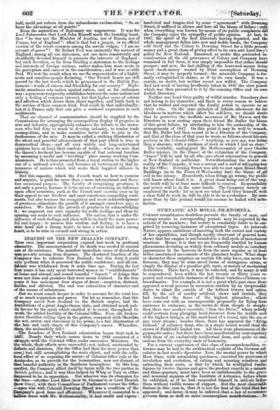EN . Q1TEST ON TILE NEW ZEALAND COMPANY.
THIS once important corporation expired last week in profound obscurity. The announcement of its death was needed to remind one of its existence. The manifest immediate cause of dissolution was poverty arising from disgrace. The chartered function of the Company was to colonize New Zealand ; but this duty it could only perform -when it possessed the public confidence; and all eon- hienoe was withdrawn from it some time ago. During the last four years it has only spent borrowed money on " establishments " oebf;:riehchatpthisubt-
were not done and promises that were never realized. In e four yours it has undergone four -stages of decay—suspicion, distrust,
and oblivion. The end was exhaustion o character and of the means of subsistence.
But we must search deeper in order to account for the total loss Company saved New Zealand to the British empire, laid the :fon- Brio atimeueoannshdreofall3)autagiteinatanAanngisal7-Swaxe:On stallortel,et"anuds "reports" he favour by the spirit which enabled it to resist throughout its work, the settled hostility of the Colonial Offiee. Poor, old, broken- down Sheridan 'rolling tipsy in the gutter, compared with Sheriden the wit, orator, and statesman in his prime, is a fair illustration of eke late and early stages of this Company's career. Wherefore, -them, the melancholy fall ?
..:'The founders of New Zealand colonization began their task in 1837. Nearly their whole course down to 1846 consisted of a struggle with the Colonial Office under successive Ministers. On the whole, their efforts were successful ; not, indeed, unattended by defeats and disasters, (far the Office had then far more power than now,) but still accomplishing' the main object, and with the cella- tend effect of so exposing the nature of Colonial-Office rule at the Antipodes, as to provide for the termination, now not distant, of that baneful authority in the Southern hemisphere. In this long conflict, the Company allied itself by turns with the two parties in British politics; and it was thus helped by Whig or Tory as either happened to be in opposition. But whoever was its champion for the time—whether Lord Eliot (now St. German's) or Lord Howick (now Grey), with their Committees of Parliament versus the Office -.---open war with Colonial Downing Street was a condition of the Company's good fame and efficiency. Whenever it consented to a -hollow truce with Mr. Mothercountry, it lost credit and vigour : hand-tied and tongue-tied by some " agreement " with Downing I Street, it suffered in silence and bore all the blame of failure only when everything was known by means of its public complaints did the Company enjoy the sympathy of public opinion. At last, in 1847, the spirit of the first Directors having departed, and the whole management fallen into new and feeble hands, the Company sold itself and the Colony to Downing Street for a little present money and a great sham of giving effect to its own and Lord Grey's policy for New Zealond. Inasmuch as under this pretended re- construction all the old grievances of Colony and Company _have remained in fall force, it was simply impossible that either should prosper; and now, the last shilling of the borrowed money being spent—hush-money wasted by blind accomplices of Downing Street, it may ..be properly termed—the miserable Company is for- mally extinguished in shame, as if by its own hands. It was a suicide, no doubt, but neither recent nor wilful. The Company died last week of having heedlessly taken in 1847 the slow poison ' which 'was then presented to it by the cunning Office and its own foolish Directors.
' Neither was Lord Grey guilty of wilful murder. Treachery does 'not belong to his character; and there is every reason to believe ' that he wished and expected- the deadly potion to operate as an elixir Titre. On the same principle of infinite allowance for his I blindness in matters which affect his self-love, we should doubt that he perceives the ineffable meanness of Mr. Hawes and the Directors in now casting upon their friend Mr. Buller the blame ' of this great failure by attributing to him the authorship of the
arrangements of 1847. On this point it may be -well to remark, that Mr. Ituller had then ceased to be a Director of the Company, and that at the close of that year he wrote as follows about hisewn position in the Colonial Office—" Anything, as you say, was better than a sinecure, withapretence of work in which I had no share."
The veritable, =disguised Mr. Mothercountry of poor Charles Buller rejoices (in the Times) at the extinction of the Company. "Amen" will be snia by all who care about colonization in general or New Zealand in particular. Notwithstanding the recent un- reality of the Company, it was a screen and a sort of whipping-boy for the Office. Downing Street was able to east upon Broad Street Buildings (as in the Times of Weslnesday last) the blame of Al evil in the colony. Henceforth, when things go wrong, the public will know whose fault it is. A great sham being out of the vavy, the truth will be at least more difficult to conceal. Responsibility and power will be in the same hands. The Company, merely en- cumbered the earth : let us now see what Lord Grey himself, with a clear -field to work in, will be able to do as a colonizer. By none more than by this journal would his success be hailed with satis- faction.


























 Previous page
Previous page